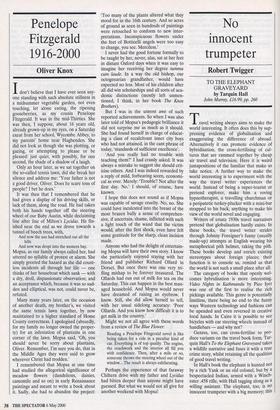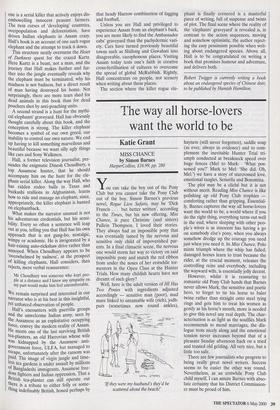No innocent trumpeter
Robert Twigger
TO THE ELEPHANT GRAVEYARD by Tarquin Hall John Murray, £16.99, pp. 260 ravel writing always aims to make the world interesting. It often does this by sup- pressing evidence of globalisation and exaggerating the difference of abroad. Alternatively it can promote evidence of hybridisation, the cross-fertilising of cul- tures that are rammed together by cheap air travel and television. Here it is weird juxtapositions of the familiar that make us take notice. A further way to make the world interesting is to experiment with the way the travel writer experiences the world. Instead of being a super-tourist or pretend explorer, make him a roving hypnotherapist, a travelling churchman or a peripatetic turkey-plucker with a mini-bar strapped to his back; anything to make his view of the world novel and engaging.
Writers of ersatz 1930s travel narratives pretend that globalisation hardly exists. In these books, the travel writer strides through Johnny Foreigner's funny (usually made-up) attempts at English wearing his metaphorical pith helmet, taking the pith. These books develop and enrich existing stereotypes about foreign places; their function is to console us, remind us that the world is not such a small place after all.
The category of books that openly wel- comes hybridisation is more interesting. Video Nights in Kathmandu by Pico Iyer was one of the first to realise the rich pickings available. This genre is potentially limitless, there being no end to the funny ways Western technology and fashions can be upended and even reversed in creative local hands. In Cairo it is possible to see bicycles with car steering wheels instead of handlebars — and why not?
Genres, too, can cross-fertilise to pro- duce variants on the travel book form. Tar- quin Hall's To the Elephant Graveyard takes a wildlife narrative and fuses it with a true crime story, whilst retaining all the qualities of good travel writing.
In Hall's book the elephant is hunted not by a rich Yank or an old colonel, but by a bespectacled Indian, armed with a Winch- ester .458 rifle, with Hall tagging along as a willing assistant. The elephant, too, is no innocent trumpeter with a big memory; this one is a serial killer that actively enjoys dis- embowelling innocent peasant farmers. The twin curses of 'developing' countries, overpopulation and deforestation, have driven Indian elephants in Assam crazy. Hall's book is an account of one such rogue elephant and the attempt to track it down. This structure neatly overturns the Heart of Darkness quest for the crazed Kurtz. Here Kurtz is a beast, not a man, and the journey that Hall makes further and fur- ther into the jungle eventually reveals why the elephant must be terminated, why his madness is not badness, but a direct result of man having destroyed his home. Not surprisingly, there are more tears shed for dead animals in this book than for dead poachers shot by anti-poaching units. A second strand is a hunt for the mythi- cal elephants' graveyard. Hall has obviously thought carefully about this book, and the conception is strong. The killer elephant becomes a symbol of our own greed, our inability to control our own nature. We end up having to kill something marvellous and beautiful because we want silly ugly things like cars and Sony Walkmen. Hall, a former television journalist, per- suades the enigmatic Dinesh Choudhury, a top Assamese hunter, that he should accompany him on the hunt for the ele- phant serial killer. Along the way Hall, who has ridden rodeo bulls in Texas and buzkashi stallions in Afghanistan, learns how to ride and manage an elephant, since, appropriately, the killer elephant is hunted on elephantback. What makes the narrator unusual is not his adventurous credentials, but his sensi- bility. Every so often a sentence will leap out at you, telling you that Hall has his own approach that is not gung-ho, nostalgic, Wimpy or academic. He is invigorated by a hair-raising auto-rickshaw drive rather than annoyed. When Choudhury appears to be overwhelmed by sadness', at the prospect of killing elephants, Hall considers, then rejects, mere verbal reassurance: Mr Choudhury was someone who kept peo- ple at a distance and I knew any sympathy on my part would make him feel uncomfortable.
We remain surprised and interested in our narrator who is at his best in this insightful, yet unforced observation of people. Hall's encounters with guerrilla groups and the unwelcome Indian army, seenby the Assamese as an exploitative occupying force, convey the modern reality of Assam. He meets one of the last surviving British tea-planters, an old Harrovian whose wife was kidnapped by the Assamese anti- government force, ULFA, but managed to escape, unfortunately after the ransom was Paid. The image of virgin jungle and time- less tea gardens is under assault by millions of Bangladeshi immigrants, Assamese free- dom fighters and Indian oppression. That a British tea-planter can still operate out the re is a tribute to either folly or some- thing indefinably British, honed perhaps by that heady Harrow combination of fagging and football.
Unless you are Hall and privileged to experience Assam from an elephant's back, you are more likely to find the Ambassador cabs' graveyard than the pachydermic vari- ety. Cars have turned previously beautiful towns such as Shillong and Guwahati into disagreeable, cacophonous places. Visiting Assam today tests one's faith in creative cross-fertilisation of cultures to overcome the spread of global McRubbish. Rightly, Hall concentrates on people, not scenery when writing about these places.
The section where the killer rogue ele- phant is finally cornered is a masterful piece of writing, full of suspense and twists of plot. The final scene where the reality of the 'elephants' graveyard' is revealed is, in contrast to the action sequences, moving and somehow optimistic, the author reject- ing the easy pessimism possible when writ- ing about endangered species. Above all, Hall is to be congratulated on writing a book that promises humour and adventure, and delivers both.
Robert Twit,:er is currently writing a book about an endangered species of Chinese deer, to be published by Hamish Hamilton.



































































 Previous page
Previous page